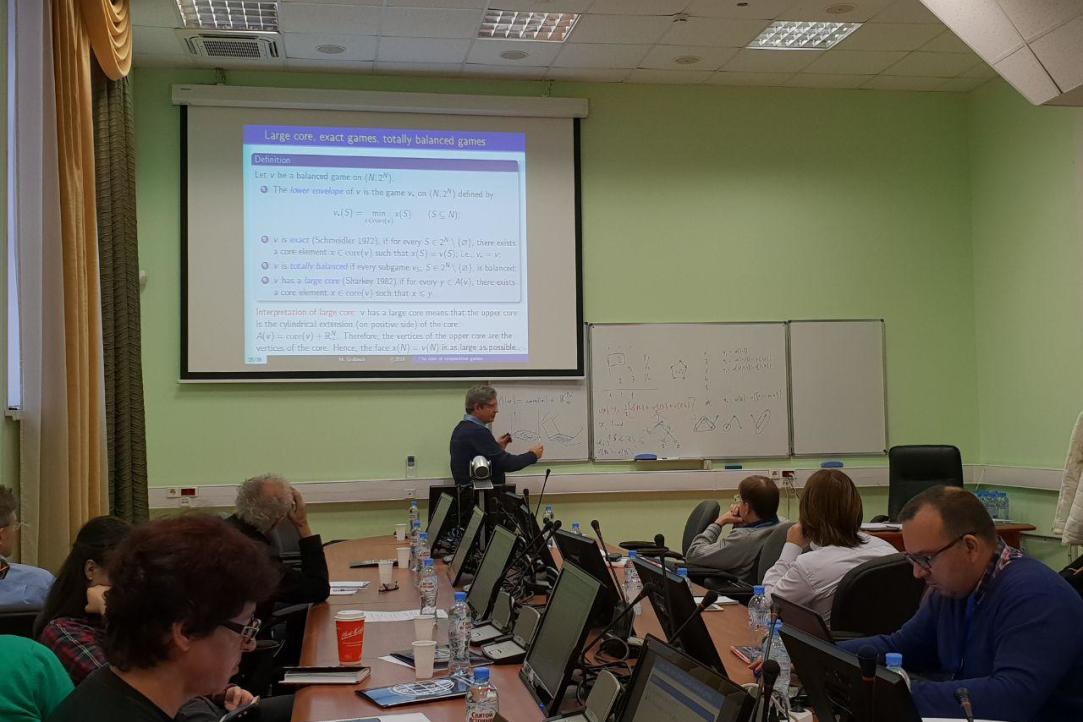Irina Levina studied evidence from Russian firms to explore whether decentralization of firms can be successful under weak institutions. She introduced the concepts of real decentralization for the delegation of decision-making authority in firms to professional people hired though open competition, and of cautious decentralization – for the delegation to people hired through connections. Irina demonstrated that really decentralized Russian firms are, on average, significantly more likely to implement investment.
В старых версиях браузеров сайт может отображаться некорректно. Для оптимальной работы с сайтом рекомендуем воспользоваться современным браузером.
✖
- A
- A
- A
- ABC
- ABC
- ABC
- А
- А
- А
- А
- А
Regular version of the site
-
The Department
109028, Moscow, Pokrovsky Boulevard 11, T423
Phone: +7 (495) 621 13 42,
+ 7(495) 772 95 90 *27200; *27212.
Email: dhm-econ@hse.ru; shatskaya@hse.ru
Administration
School Head
–
Fuad T. Aleskerov
Manager
–
Oksana Kolotvina

Senior Administrator
–
Svetlana Shatskaya
Book
 New Centrality Measures in Networks: How to Take into Account the Parameters of the Nodes and Group Influence of Nodes to Nodes
New Centrality Measures in Networks: How to Take into Account the Parameters of the Nodes and Group Influence of Nodes to Nodes
Aleskerov F. T., Shvydun S., Meshcheryakova N.
CRC Press, 2022.
Article
Belenky A., Fedin G., Kornhauser A.
International Journal of Public Administration. 2021. Vol. 44. No. 13. P. 1076-1089.
Book chapter
In bk.: AIP Conference Proceedings. Vol. 2328: ICMM-2020. AIP Publishing LLC, 2021. Ch. 060001. P. 060001-1-060001-4.
Working paper
Zlotnik A., Kireeva O.
math. arXiv. Cornell University, 2020. No. arXiv:2011.14104v2[math.NA].
Research & Expertise – News

Gerhard Toews analyzed the consequences of sending "enemies of the people" to the Gulag. He showed that areas around camps with a larger share of enemies among prisoners are more prosperous today, as captured by night lights per capita, firm productivity, wages, and education.

Natalia Naumenko studied the impact of the 1933 Soviet famine on population and urbanization patterns and argued that the shortage of labor during the crucial years of rapid industrialization hindered the development of cities in areas struck by the famine.
December 04, 2018

Tenured HSE Professor Fuad Aleskerov, who is the head of the Faculty of Economic Sciences’ Department of Mathematics, has become a member of the Informatics section of the Academia Europaea.
November 29, 2018

On Wednesday, November 21 the all-Russian seminar "Mathematical methods of decision analysis in economics, finance and politics" was held. K. Velikanov gave a lecture on "Direct Deliberative Democracy: participatory government model based on a massive direct discussion".

Inna Zaitseva studied players' incentives to exert different levels of effort in different games. The hypothesis of her research suggests that players can express their loyalty to the values of their club by increasing the level of effort in matches, which are considered as principal for the club. One of the explicit criteria for principal matches in football is a derby status of a game. This research demonstrates, that players in Bundesliga in season 2017-2018 exerted a greater level of effort in home derby games, which supports the idea of players’ loyalty to club’s values.
November 20, 2018

Gari Walkowitz discussed the effectiveness of (apparently) fair procedures - which are under the full control of the agent in situations which entail a conflict of interest and when social pressures to conform are high - and analyzed a specific form of inter-personal deception: moral hypocrisy, i.e., saying one thing (trying to appear moral to others) but doing another (act immorally).
November 14, 2018


Today was the third day of the Autumn school 'Current Trends in Decision-making Analysis' organized by the International Laboratory of Decision Choice and Analysis. The invited lecturers included outstanding academics and researchers Itzhak Gilboa, Theocharis Grigoriadis, Michel Grabisch, Gabrielle Demange, Saptarshi Mukherjee, Stefan Napel, Agnieszka Rusinowska, William Thomson, Katarína Cechlárová.


- About
- About
- Key Figures & Facts
- Sustainability at HSE University
- Faculties & Departments
- International Partnerships
- Faculty & Staff
- HSE Buildings
- Public Enquiries
- Studies
- Admissions
- Programme Catalogue
- Undergraduate
- Graduate
- Exchange Programmes
- Summer Schools
- Semester in Moscow
- Business Internship
-
https://elearning.hse.ru/en/mooc/
Massive Open Online Courses
-
https://www.hse.ru/en/visual/
HSE Site for the Visually Impaired
-
http://5top100.com/
Russian Academic Excellence Project 5-100
- © HSE University 1993–2025 Contacts Copyright Privacy Policy Site Map
- Edit

